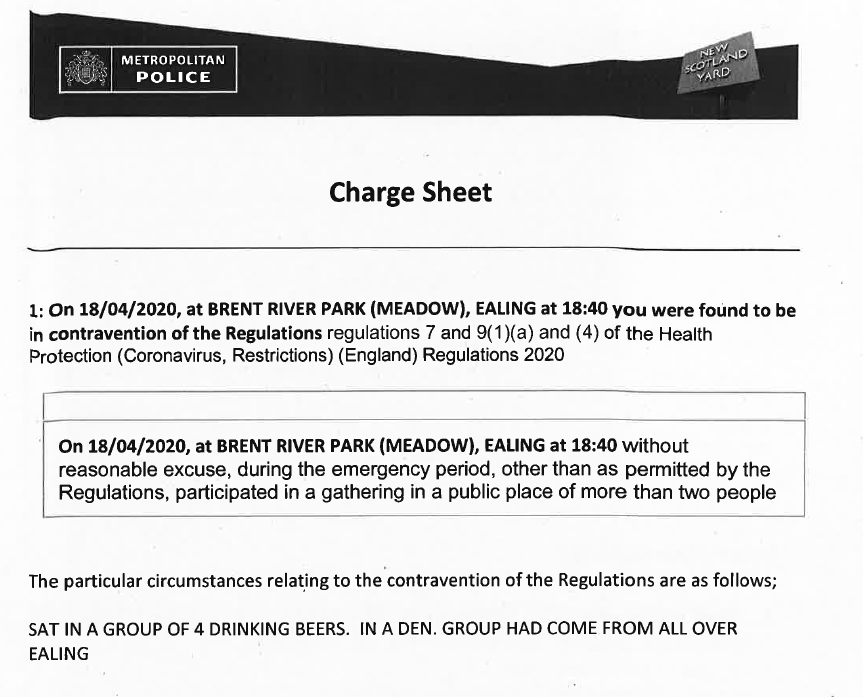
Lockdown breach prosecutions are largely done behind closed doors in London. Most people don't know they're happening. The public aren't told about them.
I've looked into the case of three men & a woman caught having beers together in the park on April 18 to shed a bit of light.
I've looked into the case of three men & a woman caught having beers together in the park on April 18 to shed a bit of light.
First off, these are Single Justice Procedure cases dealt with on the papers alone. No open hearing, no prosecutor, no defence lawyer, just a magistrate & legal advisor using the documents put in front of them to take decisions.
These four people were spotted by police in Brent Park on April 18, drinking beer in a 'den' at a time when everyone had to stay at home unless you had a reasonable excuse to be out and about.
There's nothing to suggest these people weren't in breach of the coronavirus laws.
There's nothing to suggest these people weren't in breach of the coronavirus laws.
To get to a court prosecution, they were all offered a £60 fixed penalty notice and failed to pay it.
The police officer at the scene set out the circumstances in a statement to the court:
The police officer at the scene set out the circumstances in a statement to the court:

They each get a pack of documents sent to their homes, including an explanation of the charge, the police evidence, an explainer of the next steps, and a chance to enter a plea in writing.
Very similar to the paperwork for driving offences.



Very similar to the paperwork for driving offences.




With our 4 drinkers, the evidence against them was identical - same police statement for each case. None of them engaged with the court at all & they were all - unsurprisingly - found guilty by the single magistrate.
However the way they were sentenced is hard to explain.
However the way they were sentenced is hard to explain.
Man A was given a £150 fine and told to pay £100 costs and a £34 victim surcharge.
The magistrate on October 1 dealt with 22 cases in the space of two hours. That's an average of five-and-a-half minutes per case.
The magistrate on October 1 dealt with 22 cases in the space of two hours. That's an average of five-and-a-half minutes per case.
The other three ended up before a different magistrate on Nov 3 & their bank balances took much more substantial hits.
Man B & the woman were fined £660, ordered to pay £100 costs & a £66 surcharge each.
Man C was landed with an £810 fine, the £100 costs and an £81 surcharge.
Man B & the woman were fined £660, ordered to pay £100 costs & a £66 surcharge each.
Man C was landed with an £810 fine, the £100 costs and an £81 surcharge.
Man A came before a more charitable magistrate, it seems
I can't work out why was Man C punished so harshly.
I've got all the paperwork the magistrate had, there's nothing to explain it. In fact Man B has a list of previous convictions which doesn't seem to have harmed his cause
I can't work out why was Man C punished so harshly.
I've got all the paperwork the magistrate had, there's nothing to explain it. In fact Man B has a list of previous convictions which doesn't seem to have harmed his cause
These cases are largely dealt with in one sitting, the briefest of trials, guilty verdicts, and straight to sentence.
Only in cases where the magistrate has spotted a problem or needs more information is the cases punted off for another hearing.
Only in cases where the magistrate has spotted a problem or needs more information is the cases punted off for another hearing.
To try to explain the high-level penalties, I looked at a case which ended with a £1100 fine. Seemed steep but made sense once I'd seen the court papers.
A £150 fine for an Apr 16 lockdown breach & was prosecuted again for his 3rd late-night foray in 3 days on May 1.
A £150 fine for an Apr 16 lockdown breach & was prosecuted again for his 3rd late-night foray in 3 days on May 1.
In comparison, there was nothing at all to suggest Man C was a repeat offender.
My conclusion is either courts are making decisions based on secret extra information, or lockdown breakers are getting wildly different treatment depending on when their case is in court.
My conclusion is either courts are making decisions based on secret extra information, or lockdown breakers are getting wildly different treatment depending on when their case is in court.
Man C's magistrate took pity on another offender who went to the trouble of entering a guilty plea and sending a "sorry for the inconvenience" note, saying he regretted not paying the initial fixed penalty notice. He escaped with an £80 fine.
In all reality, no one will revisit these prosecutions to see if they were done correctly. Many probably were, but the lack of consistency is troubling.
This is all using legislation which was rushed through, no Parliamentary scrutiny, & it's been repeatedly misused in the past
This is all using legislation which was rushed through, no Parliamentary scrutiny, & it's been repeatedly misused in the past
Finishing where I started, the public has little idea these prosecutions are happening. Only a handful of journalists get the detailed court registers, HMCTS's new web portal of court lists doesn't include them, and they aren't advertised at the courthouse.
• • •
Missing some Tweet in this thread? You can try to
force a refresh


